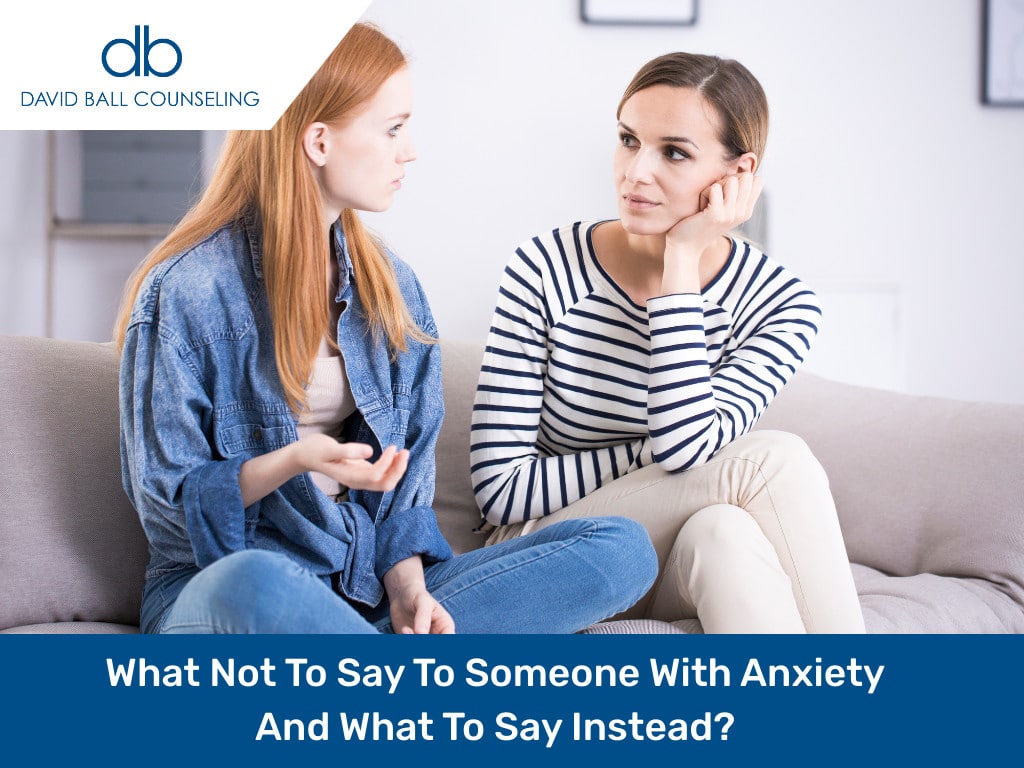What Not To Say To Someone With Anxiety – and What To Say Instead?

If you have a friend, loved one, or even an acquaintance who struggles with anxiety, you know that finding the right thing to say can be difficult. Chances are that you want to offer them support, especially if they are experiencing high levels of stress. In moments like these, the right words can be comforting – but it is important that you also know what not to say to someone with anxiety.
Anxiety is the brain’s natural response to fear – and it helps us prepare and stay safe. Fear and anxiety are hardwired into us. Fear and anxiety are NORMAL and NEEDED in our lives. Yes, fear and anxiety feel uncomfortable in our bodies. However, at times our body needs to make us afraid to get our attention. If we are walking across the street and we hear the rush of oncoming traffic, we need to feel the fear to get our attention and turn back. In relationships, our fear can alert us to people who may be trying to take advantage of us or hurt us. Fear and anxiety are warning signals to protect us mentally and physically.
Challenges occur when this sense of fear doesn’t switch off or is on high alert most of the time. These struggles with anxiety are incredibly common. Forty million Americans experience some level of anxiety issues. In some cases, anxiety can be caused or triggered by certain situations, such as stress at work or relationships. For others, anxiety is a genetic factor or may be caused as a result of a traumatic event.
Every person experiences and deals with anxiety differently. But one thing that is true across the board is the desire and need for support from others, especially during times when anxiety levels are increasing.
It is important to learn how you can help a person who deals with overwhelming anxiety and make them feel safe, supported, and understood by saying helpful things to them. But at the same time, you should also be aware of things that are not helpful to tell a person with anxiety. The unhelpful questions or statements can sometimes create more anxiety for people.
Here is some advice on what not to say to someone with anxiety – and words of support that you can offer instead.
It’s Not That Bad, Just Calm Down
According to Psychiatry.org, the most common anxiety disorders include specific phobias, social anxiety, panic disorder, generalized anxiety, and separation anxiety. When a person is triggered by an event (such as a stressful social setting or a situation with a specific phobia) or they fear that they may be put into this position, their internal warning system (built on anxiety) may kick into high gear.
For instance, people with social anxiety may fear that they will say something or do something embarrassing – and become overwhelmed by this possibility. If a person is verbalizing these thoughts to you, it is helpful not to dismiss them. This will only make the person with anxiety feel worse and even perpetuate thoughts that they are unwanted or not important.
Explaining these issues away with logic is not particularly helpful either. To a person with anxiety, their fears feel very real, and hearing that things “aren’t that bad” is not helpful and quite diminishing.
Instead, offer ways you can help them feel supported and connected like:
- “Is there something I can do to help you?”
- “I’m here to listen/I’ll stay with you,”
- “Do you want to step out and get some air?”
This can help to provide some support in the moment, which may be what they need to calm themselves down. Social support plus understanding is really helpful to people who feel overwhelmed with fear.
Have You Tried This?
While you may think offering advice to manage anxiety symptoms is helpful, chances are you are making the issue worse. Drawing attention to a person’s anxiety issues and recommending generic solutions like yoga, meditation, change of diet, or (especially) medication is not your job – and chances are, the person has tried these before.
Trying to help people in need is natural. Unsolicited advice can make people feel shame, and when people are feeling heightened anxiety, shame can make anxiety worse! Instead focus on what you can offer at the moment, whether it be holding their hand, giving them space, or simply listening to them talk things through.
I Totally Know How You Feel
Humans are generally quite empathetic and sympathetic creatures. We try to connect with others based on similarities – including our emotions. However, your feelings are not that useful to a person who has anxiety.
Even if you experience heightened anxiety challenges, it does not help an anxious person to hear that you have the same problem as them. This can be trivializing – and drawing up comparisons of your own feelings or experiences may actually make them feel worse.
Instead, acknowledge their struggles and say something like:
“I see that you’re really worried about A, B, and C. Do you want to talk about it.”
For instance, say that a person is feeling incredibly anxious about an upcoming job interview and fear that they will bomb it. You should first acknowledge their feelings and validate them. Example: “Yeah it makes sense you would have some worry about that. It seems like a big deal!” Validating a person’s feelings is helpful and normalizing when anxiety can make us feel like we are “not normal”. Simply letting someone who is afraid to know what they are dealing with makes sense is really helpful.
Everything Will Work Out Just Fine
One of the most generic responses to a person expressing their anxiety is: “Don’t worry, it’s all going to be fine.” Sometimes reassurance can be helpful to others. However, trying to reassure people and let them know “the future will be ok” is patronizing and trivializing. While the statement “it’ll be fine” can seem true to you, what is at stake for the other anxious person might be really intense and unknown.
Instead of forecasting a positive outcome, reassure them of your support regardless of the outcome. For example, if a person is starting to feel anxious because of large work or school projects they fear they will fail, let them know you will be there for them with any outcome. A helpful line can be “I know you are stressed out about this. Either way I am here for you and want you to know it”.
Are You Talking To Someone About This?
If you notice that a friend or family member’s life is affected by constant anxiety, it is natural to want to help them in any way possible. However, it may not be your place to ask if they have a therapist or are taking medication. It can be helpful to wait for the person to bring this up to you if they feel comfortable.
Again, focus on ways you can be supportive.
Tell them you are available if they need someone to talk to and will listen without judgment or criticism. If they do talk to you about their therapy or internal work, try not to pry. Often, this is extremely personal. Simply providing a space for someone to talk, while you listen compassionately is really helpful for people with anxiety.
Apparently in the US, nearly half of people with anxiety disorders do not receive treatment of any kind. While you may want to tell them they could benefit from seeing a counselor or participating in group therapy, it is not usually helpful to force your ideas on someone who is suffering.
I have worked as a counselor for many years with people who experience anxiety. Treatment is almost always more successful when a person comes to this realization on their own. People who are challenged with vigilant anxiety may need others around them to help them see that outside therapeutic options may be needed. It can be useful to ask certain questions that could help people gain clarity about the intensity of their anxiety:
- Have you noticed your anxiety getting worse or better lately?
- Do you think anxiety is affecting your performance at work?
- Are you losing sleep because you are worried?
- Is anxiety affecting your relationships?
- Is it making daily life difficult?
- How are you taking care of yourself and your emotional wellbeing?
These topics may help a person you care about who deals with anxiety realize that they need additional support, whether it be talking to a counselor, participating in therapy, or even taking medication.
Conclusion
People who deal with intense anxiety need support from the people who care about them – and knowing what to say and what not to say to a person with anxiety is crucial if you want to help.
If you are struggling with anxiety symptoms and you want to learn more about speaking with a counselor, I encourage you to reach out. I offer individual and group therapy sessions which can be done in-person, over the phone, and virtually through Zoom.
Every person’s path to treating their anxiety is different. My goal is to help you find the treatment plan that works best and offer support every step of the way. Contact me today to learn more and we will be in touch soon.


